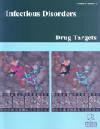-
s Antimicrobials Targeted to the Replication-Specific DNA Polymerases of Gram-Positive Bacteria: Target Potential of dnaE
- Source: Infectious Disorders - Drug Targets, Volume 12, Issue 5, Oct 2012, p. 327 - 331
-
- 01 Oct 2012
Abstract
DNA polymerases pol IIIC and dnaE [i.e. pol IIIE] are essential for replicative DNA synthesis in low G:C Gram-positive eubacteria. Therefore, they have strong potential as targets for development of Gram-positive-selective antibacterial agents. This work has sought to extend to dnaE the recent discovery of antimicrobial agents based on pol IIICspecific dGTP analogs. Compound 324C, a member of the same dGTP analog family, was found to be a potent and selective inhibitor of isolated dnaE in vitro. Surprisingly, 324C had no inhibitory effect in either intact Bacillus subtilis cells or in permeabilized cell preparations used to assess replicative DNA synthesis directly. It is proposed that the failure of 324C in the intact cell is a consequence of two major factors: (i) its template-dependent base pairing mechanism, and (ii) a specific subordinate role which dnaE apparently plays to pol IIIC. To generate an effective dnaE-selective inhibitor of replicative DNA synthesis in Gram-positive bacteria, it will likely be necessary to develop a molecule that attacks the enzyme’s active site directly, without binding to template DNA.


